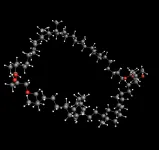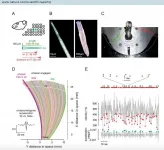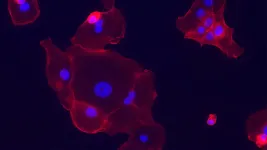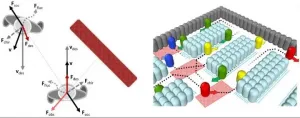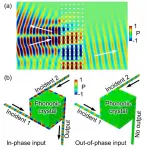Empathy may drive rats and other mammals to help friends over strangers
A new study identifies the brain regions involved in rats' tendency to help members of their own social group over strangers, with findings that may help scientists better understand similar social biases in humans
2021-07-13
(Press-News.org) Rescuing a member of their own social group, but not a stranger, triggers motivational and social reward centres in rats' brains, suggests a report published today in eLife.
The study provides the first description of similar brain activity in both rats and humans underlying this socially biased behaviour. The findings add to our understanding of social biases and could help with developing ways to promote cooperation outside of an individual's social group.
"Humans, as well as many other creatures, are biased toward helping other members of their social groups over individuals they view as outsiders, and this can have a negative impact in diverse societies where different groups need to cooperate in order to thrive," says first author Inbal Ben-Ami Bartal, a faculty member at the Sagol School of Neuroscience and the Psychology Department at Tel-Aviv University, Israel. "Understanding the brain mechanisms underlying these biases is essential to finding ways to eliminate them."
To explore this further, Bartal and a multinational team of colleagues placed rats in a situation where either a cage mate of the same type of rat, or a different type of rat they had never met, was trapped. In the experiments, most rats learned to free their cage mate, but few rescued the stranger.
The team then examined the brain activity associated with these behaviours to understand why the rats were biased towards helping their cage mates. They found that some regions of the brain are activated in response to the distress of either a cage mate or an unfamiliar rat, meaning that rats sense the distress of another animal whether or not they know them. But additional brain regions associated with reward seeking and positive social experiences were turned on only when a cage mate was in distress. "This brain activity in the rats that helped their fellow group members suggests an empathetic response to their distress," Bartal says.
Previous studies in humans have also suggested that empathy towards fellow group members drives the desire to help them but not strangers. The current findings suggest that similar brain activity may drive these social biases in rats and potentially other mammals.
"We've provided the first evidence for a common biological mechanism driving empathic helping behaviours in humans and rats in response to the distress of friends," concludes senior author Daniela Kaufer, Professor at the Department of Integrative Biology and the Helen Wills Neuroscience Institute at the University of California, Berkeley, US. "Our results lay the groundwork for future studies to better understand the brain activity involved and why it causes us to choose helping some people over others."
INFORMATION:
Media contact
Emily Packer, Media Relations Manager
eLife
e.packer@elifesciences.org
+44 (0)1223 855373
About eLife
eLife is a non-profit organisation created by funders and led by researchers. Our mission is to accelerate discovery by operating a platform for research communication that encourages and recognises the most responsible behaviours. We aim to publish work of the highest standards and importance in all areas of biology and medicine, including Neuroscience, while exploring creative new ways to improve how research is assessed and published. eLife receives financial support and strategic guidance from the Howard Hughes Medical Institute, the Knut and Alice Wallenberg Foundation, the Max Planck Society and Wellcome. Learn more at https://elifesciences.org/about.
To read the latest Neuroscience research published in eLife, visit https://elifesciences.org/subjects/neuroscience.
[Attachments] See images for this press release:
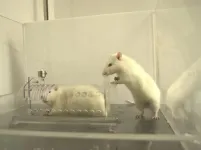
ELSE PRESS RELEASES FROM THIS DATE:
2021-07-13
Crenarchaeol is a large, closed-loop lipid that is present in the membranes of ammonium-oxidizing archaea, a unicellular life form that exists ubiquitously in the oceans. In comparison to other archaeal membrane lipids, crenarchaeol is very complex and, so far, attempts to confirm its structure by synthesizing the entire molecule have been unsuccessful. Organic chemists from the University of Groningen have taken up this challenge and discovered that the proposed structure for the molecule was largely, but not entirely, correct.
Crenarchaeol contains 86 carbon atoms and is a 'macrocycle, a large closed loop. No fewer than 22 positions in the molecule are chiral. The molecule can be present in two forms that are each other's mirror image, like a left and a right hand. In the crenarchaeol ...
2021-07-13
A new University of Iowa study suggests that metabolism of plant-based dietary substances by specific gut bacteria, which are lacking in patients with multiple sclerosis (MS), may provide protection against the disease.
The study led by Ashutosh Mangalam, PhD, UI associate professor of pathology, shows that a diet rich in isoflavone, a phytoestrogen or plant-based compound that resembles estrogen, protects against multiple sclerosis-like symptoms in a mouse model of the disease. Importantly, the isoflavone diet was only protective when the mice had gut microbes capable of breaking ...
2021-07-13
MORGANTOWN, W.Va.--Just as helicopter traffic reporters use their "bird's eye view" to route drivers around roadblocks safely, radiation oncologists treating a variety of cancers can use new guidelines developed by a West Virginia University researcher to reduce mistakes in data transfer and more safely treat their patients.
Ramon Alfredo Siochi--the director of medical physics at WVU--led a task group to help ensure the accuracy of data that dictates a cancer patient's radiation therapy. The measures he and his colleagues recommended in their new report safeguard against medical errors in a treatment that more than half of all cancer patients receive.
"The most common mistake that happens in radiation oncology is the transfer of information from one system to another," Siochi, ...
2021-07-13
How we sense texture has long been a mystery. It is known that nerves attached to the fingertip skin are responsible for sensing different surfaces, but how they do it is not well understood. Rodents perform texture sensing through their whiskers. Like human fingertips, whiskers perform multiple tasks, sensing proximity and shape of objects, as well as surface textures.
Mathematicians from the University of Bristol's Department of Engineering Mathematics, worked with neuroscientists from the University of Tuebingen in Germany, to understand how the motion of a whisker across a surface translates texture information into neural signals that can be perceived by the brain.
By carrying out high ...
2021-07-13
Scientists have found new evidence of menopause in killer whales - raising fascinating questions about how and why it evolved.
Most animals breed throughout their lives. Only humans and four whale species are known to experience menopause, and scientists have long been puzzled about why this occurs.
Killer whales are a diverse species made up of multiple separate ecotypes (different types within a species) across the world's oceans that differ in their prey specialisation and patterns of social behaviour.
Previous studies have found menopause in an ecotype called "resident" killer whales whose social structure appears to favour "grandmothering" (females using their energy and knowledge ...
2021-07-13
When a doctor gives a patient antibiotics for a bacterial infection, they usually require them to finish the entire treatment, even when symptoms go away. This is to ensure the drugs kill off any remaining bacteria. Cold Spring Harbor Laboratory (CSHL) Visiting Scientist Raffaella Sordella investigated a similar problem that occurs in some lung cancers.
Approximately 15% of non-small cell lung cancers have a mutation in a growth receptor called EGFR, causing tumor cells to grow uncontrollably. Researchers developed an effective drug that inhibits EGFR and ...
2021-07-13
A Skoltech team has developed a model for assessing infection risks for supermarket customers. The researchers believe that their model will help formulate scientifically backed rules for safe shopping during the pandemic. The paper was published in PLOS One.
The team included professor Maxim Fedorov, who serves as Skoltech's Vice President for Artificial Intelligence and Mathematical Modeling, and a research group led by professor Nikolai Brilliantov -- the Director of the Skoltech Center for Computational and Data-Intensive Science and Engineering (CDISE).
The composite model presented in the paper incorporates ...
2021-07-13
LEXINGTON, Ky. (July 13, 2021) -- A recently published study co-authored by University of Kentucky Sanders-Brown Center on Aging researcher Justin Miller, Ph.D., identifies 11 rare candidate variants for Alzheimer's disease. Researchers found 19 different families in Utah that suffered from Alzheimer's disease more frequently than what is considered normal.
Miller, an assistant professor in the UK College of Medicine, was a co-first author for the study published in the journal Alzheimer's & Dementia. The work was started at another university, however, some of the computational work was done after Miller arrived at UK in March.
For the study, genetic sequencing was conducted on two cousins from each of the 19 families. Miller says they then identified genetic variants that were shared ...
2021-07-13
Automation of technology has reshaped both the way in which we work and how we tackle problems. Thanks to the progress made in robotics and artificial intelligence (AI) over the last few years, it is now possible to leave several tasks in the hands to machines and algorithms.
To highlight these advances, in the July 2021 issue, IEEE/CAA Journal of Automatica Sinica features six articles covering innovative applications of AI that can make our lives easier.
The first article, authored by researchers from Virginia Tech Mechanical Engineering Department ASIM Lab, USA, delves into an interesting mixture of topics: intelligent cars, machine learning, and electroencephalography (EEG). Self-driving cars have ...
2021-07-13
The concept of topological phases have not only revolutionized our understanding of physics or materials, but also brought about new possibilities for applications. Recent advances in higher-order topological insulators show that multiple forms of topological states can exist at boundaries of different dimensions, which greatly enriched the potentials for diverse applications. Interesting, the topological phases can also be implemented in artificial structures in photonics, electromagnetism, and acoustics.
A recent work co-led by Dr. Guancong Ma from Hong Kong Baptist University and Dr. Ying Wu from King Abdullah University of Science and Technology explored the controlling sound propagation with topological modes at different dimensions. They designed and built ...
LAST 30 PRESS RELEASES:
[Press-News.org] Empathy may drive rats and other mammals to help friends over strangers
A new study identifies the brain regions involved in rats' tendency to help members of their own social group over strangers, with findings that may help scientists better understand similar social biases in humans

